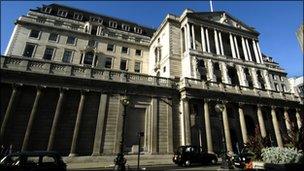Banks must be allowed to fail, says Paul Tucker
- Published

The Bank of England deputy governor says further reform is needed
Capitalism cannot work unless banks are allowed to go bust, Bank of England deputy governor Paul Tucker has said.
Mr Tucker told BBC Two's Britain's Banks: Too Big to Save? programme that despite changes to the banking system since the 2008 financial crisis, more still needs to be done.
Banks still do not hold high enough levels of capital - and no bank should be considered too big to fail.
These problems go to the very heart of the UK financial system, he said.
"If we have a system where banks take the upside but the taxpayer takes the downside something has gone wrong with capitalism, with the very heart of capitalism, and we need to repair this," Mr Tucker told BBC business editor Robert Peston.
"Capitalism can't work unless these financial firms at the centre of the heart of capitalism can be subject to orderly failure. The rules of capitalism need to apply to them just as they do to non-financial companies."
Mr Tucker said that big banks should be forced to hold sufficient capital - more than under current international rules - so that they have enough capacity to absorb losses if things go wrong.
Furthermore, new insolvency rules should be brought in to make it easier for banks to go bust without any losses falling on taxpayers.
This issue has been central to the debate about how to change the banking system to try to prevent a repeat of the 2008 financial crisis, when taxpayers were faced with the bill for bailing-out some of the world's biggest banks.
The governor of the Bank of England, Mervyn King, suggested in a speech in 2009 that "if some banks are thought to be too big to fail, then... they are too big".
Split option
When the financial crisis struck, the government stepped in to provide financial assistance for several UK banks.
Northern Rock was taken into state ownership, and the government now owns an 83% stake in Royal Bank of Scotland and a 41% stake in Lloyds Banking Group.
In June last year, the government set up the Independent Commission on Banking (ICB) in order to look at possible reforms to the UK banking sector.
In September, the commission said, external it would be considering the issue of whether banks' retail and investment operations should be split.
It also said it would look at whether "market concentration" should be reduced - with its figures showing that the top six British banks control 88% of all deposits in the country.
The commission is also looking at whether banks should have a "living will" - a declaration of how a bank would wind itself down, should any future financial crisis fatally undermine it.
The ICB has until September 2011 to make recommendations to the government.
- Published18 January 2011